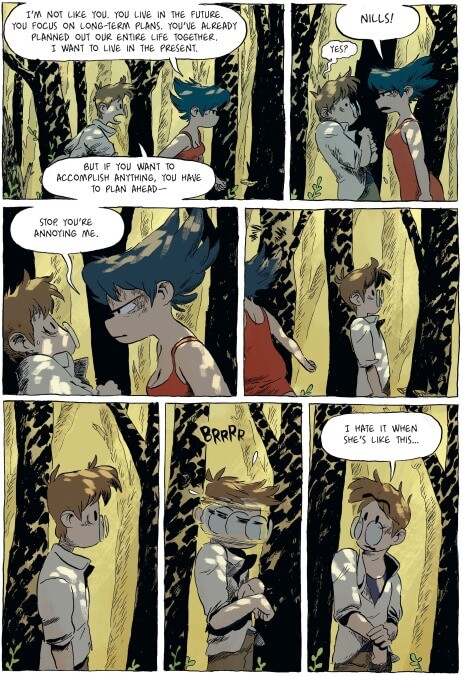Story issues hamper a beautiful fairy tale in the disappointing Kairos

In many ways, Kairos is an excellent fairy tale comic. The book opens with Nills and Annaelle arriving at a remote cabin, ready for a vacation in a flower-drenched fields and lush forests. Things quickly take a turn when they are attacked and Annaelle disappears into what looks like a different dimension, leaving Nills scrambling to find and save her. If that was all that Kairos had to offer, it would be a perfectly serviceable story with absolutely gorgeous art. But writer and illustrator Ulysse Malassagne does his best to push Kairos past well-trodden paths, with varying degrees of success.
Malassagne’s skill when it comes to the visuals of world building and character design are worth picking up the book for. It’s a style that might be unfamiliar to readers most acquainted with superhero titles—very painterly and textured. The characters share some visual roots with the likes of Tin Tin and Asterix, or even Moomin, with some features cartoonishly exaggerated while others are drawn relatively close to human anatomy. His monster designs are at times truly monstrous, with large square heads and dangerously sharp teeth. But the book begins to fall apart when you look a little closer, particularly at the obvious sex markers on the female monsters.
Overall, there’s nothing wrong with having a physical distinction between male and female non-human characters. But there are less than a handful of female characters—most of them female monsters—and all of them have the stereotypical sword-and-sorcery appearance, with at least one actual chainmail bikini. The most dangerous of all the monsters is female, and portrayed not just as hyper-sexual but also trying to force another female monster into an incestuous relationship. There’s a clear gendered divide in the book that would be predictable but disappointing, were it simply a straightforward hero’s journey.
In the final tenth of Kairos, it becomes clear Malassagne is trying to tell a very different story than it appears at first glance, but unfortunately his bad habits when it comes to drawing female characters extend deeper into the story. All of the press for Kairos has touted how the story “pushes back” on traditional damsel-in-distress tropes, but that pushing doesn’t go anywhere. The narrative isn’t evenly split between Nills and Annaelle as they struggle apart from one another; Nills has more page time and gathers a literal army on his journey, while Annaelle struggles against her foe alone. From the beginning of the book Annaelle is shown as being difficult for Nills to deal with, aggressive and moody in a way that mostly results in sympathy for more passive male characters, no matter the intention of the creator. Nills goes on to do increasingly horrific things in his attempts to find and save Annaelle and as a consequence he becomes increasingly literally monstrous. Far too late in the book it becomes clear that Malassagne is trying to tell a story of a man who choses violence and loses everything because of it, including the damsel he sacrificed everything to save. But the pacing is off, the focus is wrong, and Annaelle doesn’t get enough time with the readers for them to realize that Nills isn’t the hero of his story, but the villain.
The question of whether a protagonist can also be a villain isn’t a new one, but it does feel like there’s fresh fuel on that particular fire lately, especially in comics. Kairos is unfortunately a strong argument that, in most cases, it shouldn’t be attempted. The reader is clearly supposed to sympathize with Nills, and maybe fear him a little bit, but still expect his success; only at the very end of the book does it feel like Annaelle gains the agency required to become the hero herself, and the reader is left disoriented and dissatisfied with a change far too close to the last page. Unfortunately, the book has a lot in common with far better examples of this same story, including BOOM! Studio’s Sparrowhawk by Delilah S. Dawson and Matias Basla, which focuses on a young woman and her love for her sister. It takes a very deft hand to fight readers’ instincts and all of the expectations they bring with them from other books, and despite the gorgeous art, Kairos just doesn’t pull it off.
